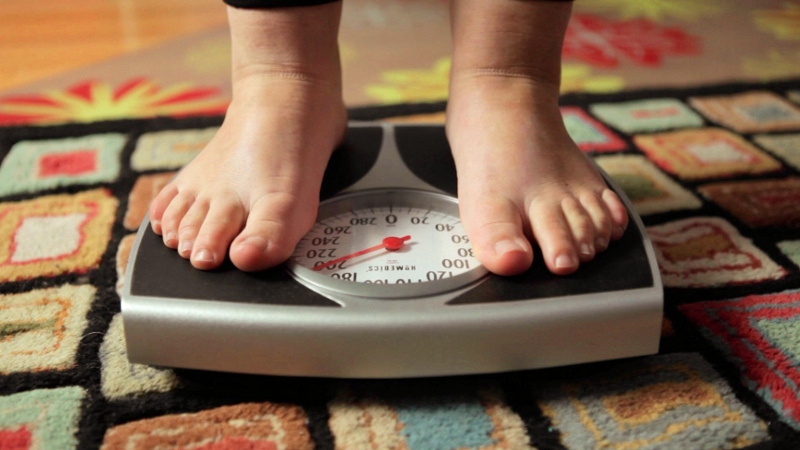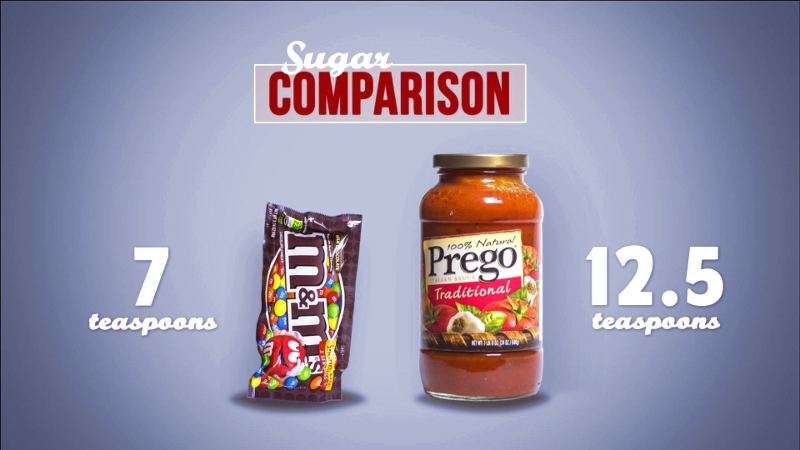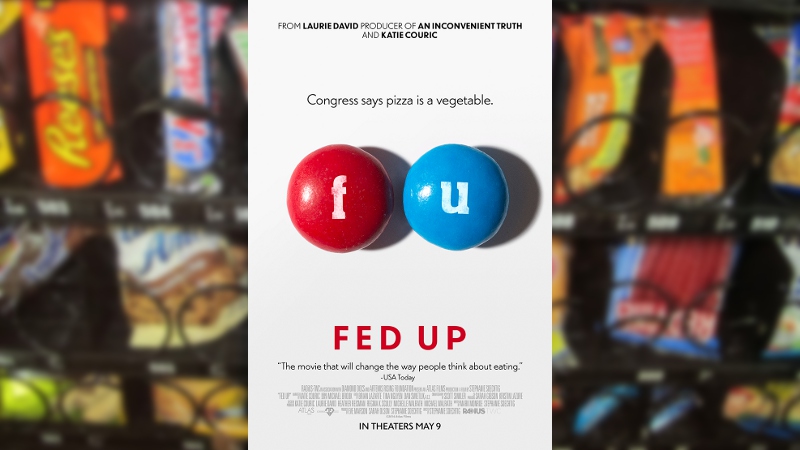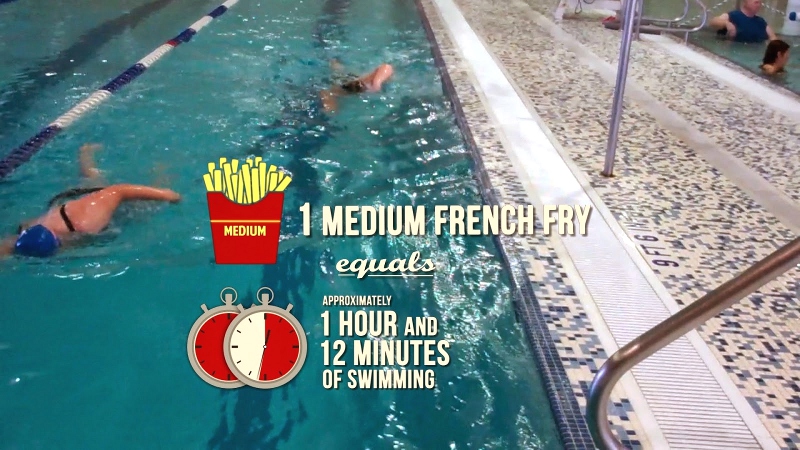| Reviews & Columns |
|
Reviews DVD TV on DVD Blu-ray 4K UHD International DVDs In Theaters Reviews by Studio Video Games Features Collector Series DVDs Easter Egg Database Interviews DVD Talk Radio Feature Articles Columns Anime Talk DVD Savant Horror DVDs The M.O.D. Squad Art House HD Talk Silent DVD
|
DVD Talk Forum |
|
|
| Resources |
|
DVD Price Search Customer Service #'s RCE Info Links |
|
Columns
|
|
|
Fed Up
 Fed Up is director Stephanie Soechtig's second documentary following 2009's Tapped, which examined the production of bottled water and its disastrous effects on regional water supplies. Not surprisingly, it was an unapologetic, one-sided affair that aggressively attacked corporations bent on putting short-term profits ahead of long-term sustainability. Though it didn't always hit the mark, Tapped's direct and passionate approach made for an educational, entertaining experience that led me to (more or less) swear off bottled water entirely. Using similar methods, Fed Up (2014) takes on an even bigger target: large chunks of the entire food industry, who have been formally charged with fattening up the world---not just America, mind you---through processed food, sneaky marketing tactics, and sugary soft drinks. Without question, it's the latter that serves as Fed Up's primary target. From the omnipresence of Coke and Pepsi in restaurants, grocery stores, school cafeterias, and just about everywhere else to the growing landscape of artificial sweeteners, you'll get more than your daily limit in just one can or bottle. We're also reminded that (with the exception of raw fruits) sugar is sugar is sugar, whether it comes in the form of honey, high fructose corn syrup, turbinado, "organic evaporated cane juice", or even a seemingly harmless bottle of OJ. Our bodies process this stuff the same way, and it's the primary culprit in this decades-long weight epidemic. Sugar added to other items runs a very close second, whether it's lurking inside obvious candidates (ketchup, jelly, breakfast cereals) or less likely ones (bread, crackers, fish sticks). Even an extra gram or two of this stuff adds up over the course of days, weeks, and years...and this added sugar just happens to be present in roughly 80% of everything sitting quietly on your average grocery store shelf. It's no surprise, then, when we realize how much obesity has grown since the 1950s and how the subsequent "fitness revolution" hasn't solved it. In a bold move, Fed Up all but denounces regular exercise as an easy solution to simply eating whatever you want. By extension, "calories in, calories out" probably won't do the trick either, since all calories (and the foods that contain them) aren't processed the same way. 150 calories of almonds, for example, will be handled much differently than 150 calories of soda (basically, a can's worth). Guess which one will keep you full longer, give you more lasting energy and, most importantly, not make your insulin spike? The almonds are probably cheaper, too.
 During its brief 92-minute lifespan, Fed Up also touches on other topics that likely got us where we are today. The 1977 nutritional guideline "Dietary Goals of the United States" (AKA "The McGovern Report") led to a deluge of low-fat foods during the next few decades, which were pumped full of sugar so people would actually eat them. Skim milk's rising popularity during the same period created a surplus of milk fat...so rather than ease up on production, dairy farmers just made more cheese to put on everything. In more recent times, the World Health Organization's TRS-916 report---which basically recommended limiting sugar intake to 10% of our daily caloric needs---was all but buried by Congress and the U.S. Sugar Association. And, of course, the regular presence of soda machines, reheated entrees, and fast food options available in school cafeterias nationwide, all due to lucrative contracts that financially benefit struggling districts. Luckily, Fed Up wants to educate us more than throw accusations around. It remains informative and entertaining despite a handful of flaws: for example, self-recorded personal stories (showcasing the day-to-day struggles of obese young children and their sympathetic but helpless parents) prove frustrating when they halt the film's momentum. Mentioned earlier, the dismissal of exercise is also confusing; maybe it's not a catch-all solution, but it certainly helps (and honestly, couldn't the popularity of TV beginning in the 1950s be just as much of a culprit here?). The constant blame put upon ingredients themselves, rather than the people who eat them, also gets old fast. Ultimately, one of the film's best moments comes during the interview of a school cafeteria worker: "They have to choose for themselves." Presented on DVD or Blu-ray courtesy of Anchor Bay Home Entertainment, the haphazard but enlightening Fed Up serves as a solid first step for anyone hoping to make better food choices, even if you're not "a statistic". It's a classic case of the message being better than the actual film, but any effort to raise awareness is obviously a step in the right direction. Featured participants include Katie Couric (who also narrates), noted doctors such as Mark Hyman, Deborah Cohen, David Kessler, Harvey Karp and Robert Lustwig, as well as other personalities and public figures like Bill Clinton, author Michael Pollan, journalists Duff Wilson and Mark Bittman, and Secretary of Agriculture Tom Vilsack. Select segments also spill over into a handful of deleted scenes, which serve as the only extras available on either disc.

Presented in the film's original 1.78:1 aspect ratio, this 1080p transfer is a capable effort that treats its source material fairly well. I say "fairly well" because certain full-frame segments---including older news broadcasts, commercials and the like---have been cropped to fill the 16x9 frame, which only makes existing problems more obvious. Other full-frame segments, oddly enough, retain the 1.33:1 aspect ratio. Either way, there's no doubt that the newer material looks great, from "talking head" interviews to on-location footage at schools and grocery stores. Some of the younger contributors' footage was obviously shot on consumer-grade digital equipment, but it's not too distracting. For the most part, Fed Up is visually on par with most modern documentaries and this Blu-ray will neither amaze nor disappoint.
DISCLAIMER: The promotional images featured in this review are strictly decorative and do not represent Blu-ray's native 1080p resolution. The DTS-HD 5.1 Master Audio mix (available in both the default original English or a full Spanish language version) is, likewise, a strong effort overall. Dialogue exchanges are clean and crisp, music cues are strong and there are even a few moments of strong rear channel and LFE effects along the way just for fun. For the most part, though, Fed Up is anchored squarely within the front channels and, without exception, sounds about as clear as its respective source material will allow. Optional English (SDH) and Spanish subtitles have also been included during the main feature.
The simple, film-themed menu interface is clean and easy to navigate, though a handful of forced logos, warnings, and trailers must be dealt with beforehand. This one-disc release is packaged in a standard keepcase; no slipcover or inserts are included, aside from a Redemption Offer for a free one-year (six issue) subscription to Eating Well magazine.
 Bonus Features The only supplement is a short collection of five Deleted Scenes, presented in 1080p and Dolby Digital 5.1 with optional subtitles. "Cooking with Dr. Hyman" sits down with the featured physician and one of the affected families for healthy cooking tips and other advice. "Ariel" and "Nashwuh" introduce two more overweight teens and their families that didn't make the final cut. "Slotting Fees" explains the practice of grocery stores renting prime display space to the highest bidder. Lastly, "Hippocratic Oath" scratches the surface of drug prescriptions being offered over sound nutrition advice. They're all worth watching, but it's a shame that more effort wasn't made to build on ideas suggested during the film.
Fed Up certainly isn't the best documentary I've seen in recent memory, but it may very well be the most important. Like 2009's Tapped (which targeted bottled water companies), Fed Up examines a problem that affects just about everyone and provides a few simple tips to get on the right track. Unfortunately, it's also a bit sloppily organized, flailing around at several targets in seemingly random order and, from a certain perspective, sends mixed messages. But much of the evidence is solid, the interviews are interesting and the plea for change is compelling...so despite its flaws, Fed Up is pretty much mandatory viewing. Anchor Bay's Blu-ray serves up a strong A/V presentation, but a lack of more substantial extras makes the $30 price tag sting a little. So whether you choose this Blu-ray or the optional DVD (even if it's just a rental), only those who saw Fed Up in theaters can afford to pass this one up. Highly Recommended.
 |
|
| Popular Reviews |
| Sponsored Links |
|
|
| Sponsored Links |
|
|
| Release List | Reviews | Shop | Newsletter | Forum | DVD Giveaways | Blu-Ray | Advertise |
|
Copyright 2024 DVDTalk.com All Rights Reserved. Legal Info, Privacy Policy, Terms of Use,
Manage Preferences,
Your Privacy Choices | |||||||













